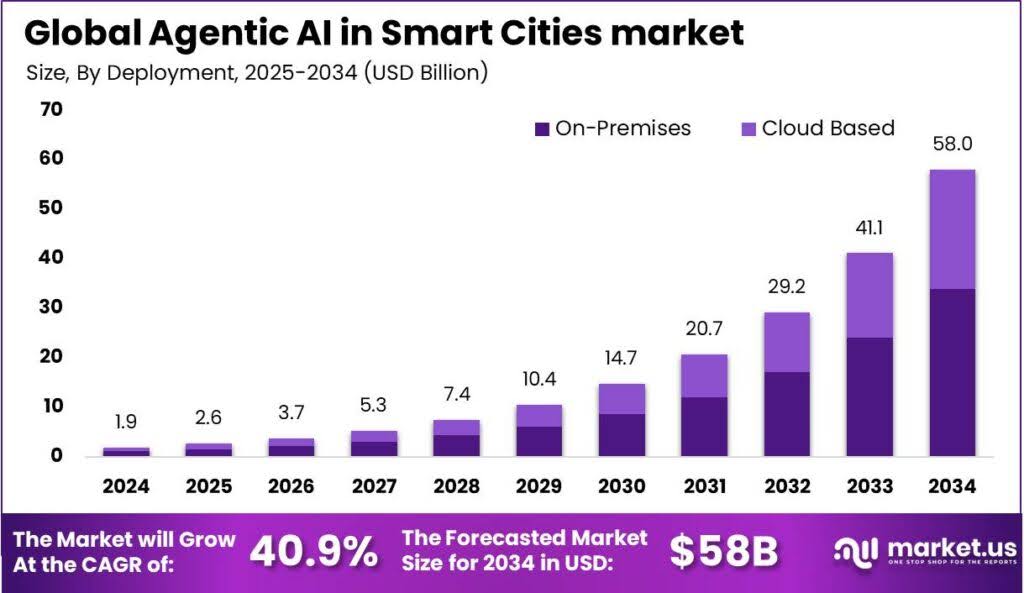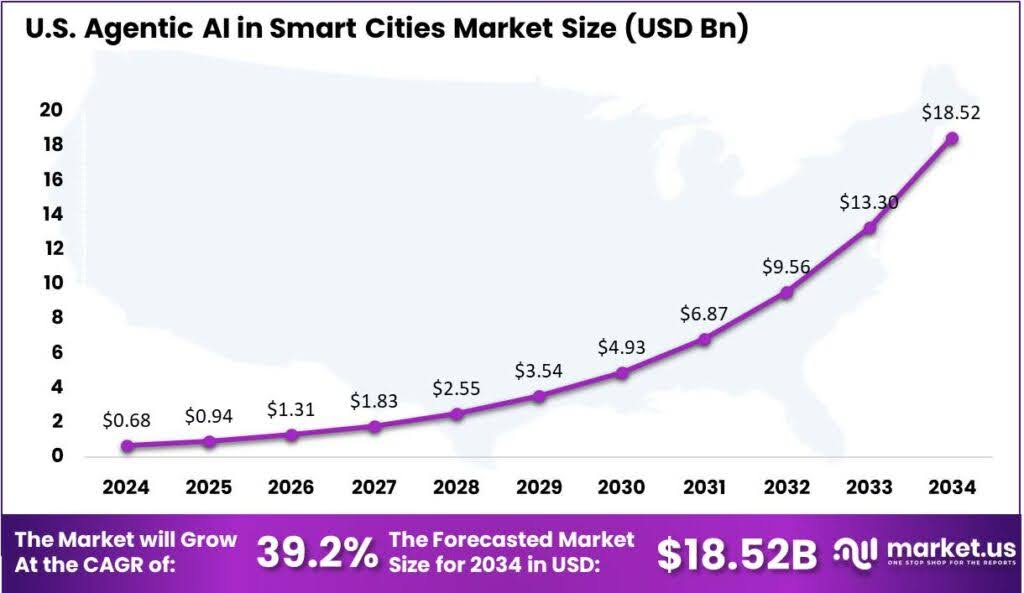The Global Agentic AI in Smart Cities market is experiencing a paradigm shift, with adoption rapidly accelerating as urban centers prioritize intelligent automation, sustainability, and real-time responsiveness. In 2024, the market stood at approximately USD 1.88 billion, and it is projected to surge to nearly USD 58 billion by 2034, expanding at a robust CAGR of 40.90%.
This growth is being fueled by the increasing integration of autonomous AI agents into city infrastructure, enabling applications such as adaptive traffic control, intelligent waste management, energy optimization, and AI-driven public safety systems. These agentic models are not just supporting decision-making – they are actively transforming how cities function in real time.

Key Insight Summary
- The market is projected to expand significantly from USD 1.88 billion in 2024 to approximately USD 58 billion by 2034, achieving a strong CAGR of 40.90%, fueled by growing investments in intelligent urban infrastructure and autonomous city management systems.
- In 2024, the Solution segment led the market, holding over 64.2% share, as cities increasingly adopted agentic AI platforms for real-time decision-making and integrated service delivery.
- The On-Premises deployment model dominated with a 58.4% share, reflecting municipal priorities for data sovereignty, regulatory compliance, and localized control of critical urban systems.
- By technology, Machine Learning & Deep Learning accounted for 26.7% of the market, highlighting their central role in enabling adaptive, predictive, and autonomous behavior in smart city ecosystems.
- The Smart Governance and Administration application was the largest segment in 2024, capturing 23.9% share, as governments leveraged agentic AI to streamline operations, enhance citizen services, and optimize resource allocation.
- North America led globally, with over 45.1% share and revenue of about USD 0.8 billion, driven by advanced digital infrastructure, policy support for smart cities, and strong technology vendor presence.
- The U.S. market alone is expected to reach USD 0.678 billion in 2024, growing at a CAGR of 39.2%, as demand rises for agent-driven systems that improve urban sustainability, livability, and operational efficiency.
Regional Analysis
North America held a dominant position in the global landscape in 2024, accounting for more than 45.1% of the total market, with revenue reaching nearly USD 0.8 billion. This regional leadership can be attributed to advanced urban digitization initiatives, strong federal and municipal investments in smart infrastructure, and a mature AI innovation ecosystem.

U.S. cities, in particular, are leveraging agentic AI to enhance emergency response systems, automate traffic signals based on predictive analytics, and reduce energy waste in buildings. As cities continue to evolve into dynamic, responsive environments, the demand for agentic AI will become a central pillar in urban planning and policy execution over the coming decade.
The U.S. market for Agentic AI in Smart Cities is expected to grow significantly, reaching a projected value of $0.678 billion by 2024.
Emerging Trend: AI‑orchestrated Urban Systems
Agentic AI is progressing from standalone decision-making to integrated, city-wide orchestration, where multiple autonomous agents coordinate traffic flow, energy grids, waste systems, and public safety simultaneously. Sensors and intelligent traffic systems demonstrate that AI can monitor live conditions, predict bottlenecks, and adjust control variables – such as signal timing or energy distribution – without human intervention.
Pilot programs in major smart cities now integrate real-time IoT streams with agentic controllers, enabling dynamic resource allocation – adjusting street lighting based on pedestrian presence, rerouting transit vehicles during congestion, and rebalancing energy demand on the fly. This holistic orchestration enhances urban resilience and improves operational efficiency at scale.
Driver: Urgent Demand for Sustainable Resource Management
Urbanization and climate pressures are intensifying demand for sustainable, resilient infrastructure. Agentic AI systems help cities achieve resource efficiency, reduce emissions, and stabilize utility services through autonomous decision-making .
Such demand is prompting municipal governments to pilot agentic AI for water management, waste collection, and energy balancing. These implementations align with policy goals for sustainability, driving investments in intelligent automation frameworks that handle complex environmental dynamics and real-time optimization.
Restraint: Privacy, Liability, and Ethical Exposure
The expansion of autonomous city systems amplifies concerns around citizen privacy and legal accountability. Surveillance-based agentic networks must manage ethical trade-offs between safety and intrusion.
Moreover, responsibility for algorithmic decisions – such as rerouting traffic or dispatching emergency services – remains ambiguous. A lack of standardized frameworks for liability, especially when multiple agencies or vendors contribute, may slow broader deployment and necessitates clear governance structures.
Opportunity: Domain‑Specific Multi‑Agent Mobility Solutions
Integration of GenAI-powered multi-agent systems into intelligent transportation systems (ITS) provides a compelling opportunity. LLM-enhanced agents can interpret diverse data inputs – traffic patterns, weather events, commuter behavior—and autonomously coordinate mobility solutions.
By implementing multi-agent coordination in urban transit, cities can reduce congestion, improve public transport reliability, and lower emissions. This technical convergence of generative AI with ITS creates novel products, like conversational commuter assistants and real-time routing agents, poised for deployment.
Challenge: Ensuring Security & Inter‑Agent Coordination at Scale
The complexity of scaling multiple autonomous agents introduces cybersecurity and interoperability challenges. Every connected component- from traffic cameras to control nodes – becomes a potential attack vector.
Furthermore, achieving coherent behavior across a diverse agent ecosystem presents challenges in standardizing messaging protocols, ensuring trust, and coordinating distributed decision-making. Cities must invest in secure architectures, agent coordination frameworks, and fail-safe mechanisms to maintain resilience and operational reliability.
Key Market Segments
By Offerings
- Solution
- Smart Ticketing
- Traffic Management
- Passenger Information
- Connected Logistics
Others
- Services
- Deployment & Integration
- Consulting & Training
- Support & Maintenance
By Deployment
- Cloud Based
- On Premises
By Technology
- Machine Learning & Deep Learning
- Computer Vision
- Natural Language Processing (NLP)
- Blockchain-Enabled AI
- Others
By Applications
- Smart Governance and Administration
- Smart Transportation and Traffic Management
- Energy Management and Sustainability
- Public Safety and Security
- Smart Healthcare and Emergency Services
- Smart Infrastructure and Urban Planning
- Smart Retail and Commercial Zones
- Others (Smart Education and Public Libraries, etc.)
Top Key Players in the Market
- ABB Limited
- EnFuse Solution
- AVEVA Group plc.
- Cisco Systems, Inc.
- Telefonaktiebolaget LM Ericsson
- Honeywell International Inc.
- International Business Machines Corporation (IBM)
- Kapsch TrafficCom AG
- Huawei Technologies Co., Ltd.
- Microsoft Corporation
- Oracle Corporation
- ams-OSRAM AG
- SAP SE
- Schneider Electric SE
- Others
Discover More – https://market.us/report/agentic-ai-in-smart-cities-market/
The macro analyst desk brings highly sought after financial news based on market analysis, insider news and company filings.
